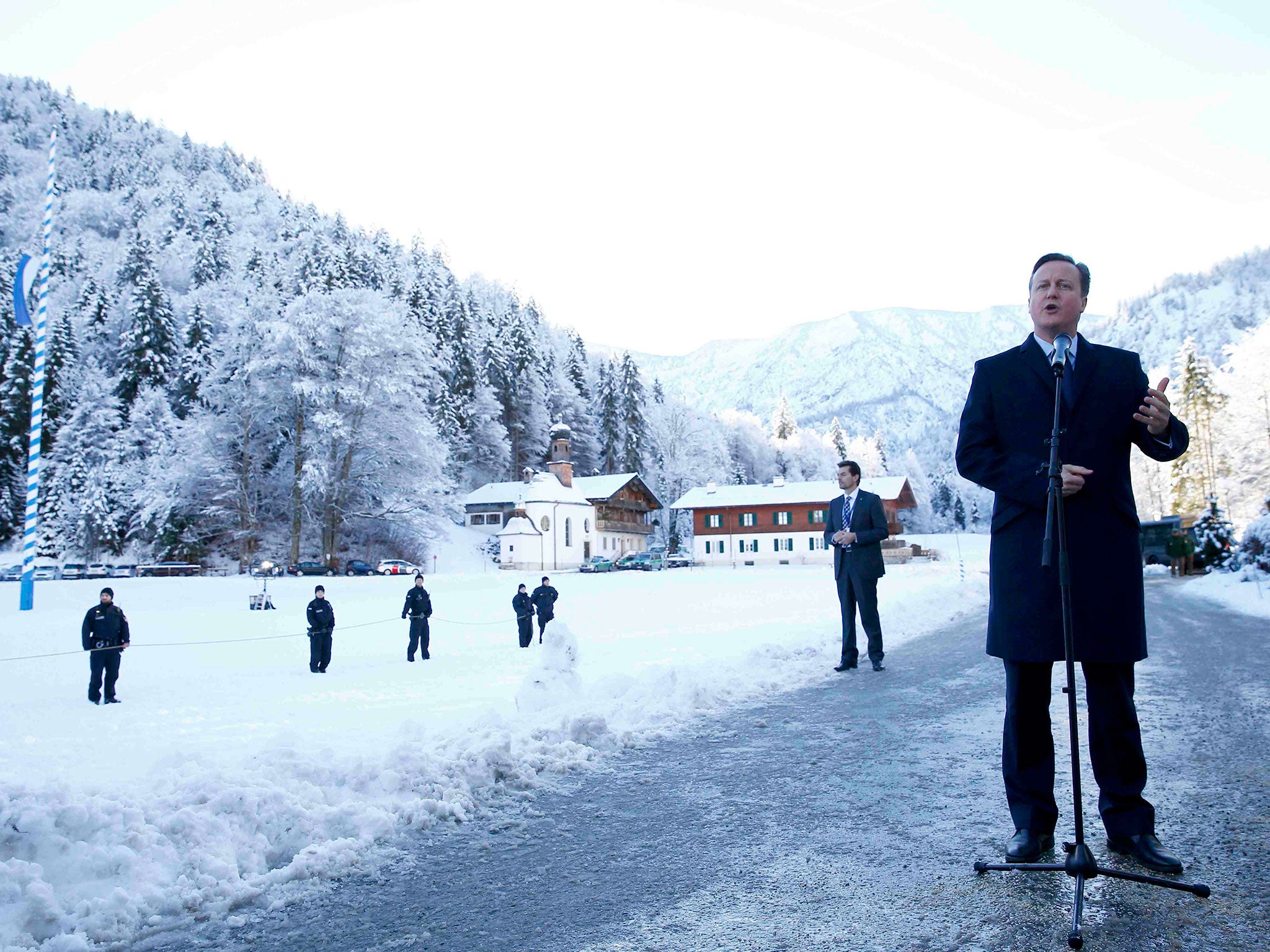David Cameron renews friendship with his right-wing German political allies
The Prime Minister is continuing in his attempts to win support for a 'new deal' for Britain in Europe

Your support helps us to tell the story
From reproductive rights to climate change to Big Tech, The Independent is on the ground when the story is developing. Whether it's investigating the financials of Elon Musk's pro-Trump PAC or producing our latest documentary, 'The A Word', which shines a light on the American women fighting for reproductive rights, we know how important it is to parse out the facts from the messaging.
At such a critical moment in US history, we need reporters on the ground. Your donation allows us to keep sending journalists to speak to both sides of the story.
The Independent is trusted by Americans across the entire political spectrum. And unlike many other quality news outlets, we choose not to lock Americans out of our reporting and analysis with paywalls. We believe quality journalism should be available to everyone, paid for by those who can afford it.
Your support makes all the difference.David Cameron may not have dressed up in bibbed Lederhosen, but the venue chosen for him to renew an old friendship with his right-wing German political allies could hardly have been more Bavarian.
Surrounded by pine-clad, snow-sprinkled sunlit mountains, in a spa resort that still belongs to the family of the late “Mad” King Ludwig of Bavaria, the Prime Minister today made his latest effort to win support in Germany for a “new deal” for Britain in Europe.
Before flying on to Hungary, Mr Cameron was in Germany, the star guest at a meeting of the Bavarian Christian Social Union (CSU) – the key right-of-centre sister of the ruling Christian Democrats.
The CSU is part of Angela Merkel’s coalition, but it has been at loggerheads with Germany’s Chancellor and her open-door refugee policies for months.
“Our relationship with Germany is so strong and so important,” Mr Cameron told journalists as he stood before an idyllic Alpine backdrop. “It is deep and strong”. The same might be said of Mr Cameron’s relationship with the Bavarian CSU.
The Prime Minister was first invited to be a guest at the party’s political meetings seven years ago, when he was leader of the opposition.
This time, Mr Cameron was there to reap maximum political capital from the relationship. His aim was to enlist CSU support for his vision of a new EU deal for the UK, the emphasis being on immigration control and plans to clamp down on so-called “EU welfare scroungers”.
Mr Cameron sees eye to eye with Horst Seehofer, the outspoken CSU leader and Bavarian Prime Minister, who is at odds with Angela Merkel over her refugee policy. More than a million refugees entered Germany in 2015 and there is little sign that the numbers are decreasing.
Unlike Ms Merkel, Mr Seehofer wants the quota limited to 200,000 refugees per year and strict border controls to contain the influx. Like Mr Cameron, he also wants a clamp down on EU citizens who misuse freedom of movement to obtain benefits.
He argues that immigration control is of “existential importance” to his own party, whose support is being undermined by Germany’s new vehemently anti-immigration party, the Alternative for Germany. Mr Cameron, who faces similar existential threats from the combined forces of Ukip and his own eurosceptic Tory colleagues, is clearly hoping that support from the CSU for his aims would help sway Ms Merkel into agreeing to them as well.
“I am confident that we will reach a conclusion that is both good for Britain and good for Europe,” he insisted. A result will not emerge until next month’s EU summit at the earliest.
Earlier, in an article for Bild, Mr Cameron warned German readers that support for the EU among the UK public had “declined over many years”.
“The problems in the EU that we are trying to fix are problems for Germany and other European partners too,” he wrote.
“We want to sweep away the excessive bureaucracy and the barriers to trade that undermine growth for us all. We want to establish the clear rules that will allow the Eurozone to make changes without damaging non-Euro countries.
“We want to deal with the loss of democratic consent for the EU by shifting power from Brussels to the Bundestag, the House of Commons and other national parliaments, so decisions are made closer to the people. And we want to stop people taking out from a welfare system without contributing to it first.”
As always, the sticking point is Mr Cameron’s plan to make sure that EU citizens who come to work in Britain will in future have to wait for four years before they can gain tax, social and welfare benefits.
Manfred Weber, a leading CSU member and the party’s main representative in the European Parliament, admitted Mr Cameron’s four-year benefit bar was a problem.
“We do not want to discriminate against the principle of freedom of movement within the EU,” he told The Independent. “But we are open for legislative changes.”
Unconfirmed reports from Brussels have suggested that Ms Merkel and her French counterpart François Hollande are mulling over a proposal which would reduce the benefit bar to three years.
“If Cameron were offered that, he would jump at it,” a source close to the British side was quoted as saying.
But despite all the professed “common ground,” Mr Cameron’s Bavarian friends dismissed the idea of a three-year bar as speculation.
Join our commenting forum
Join thought-provoking conversations, follow other Independent readers and see their replies
Comments